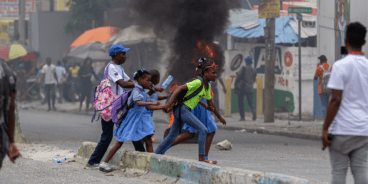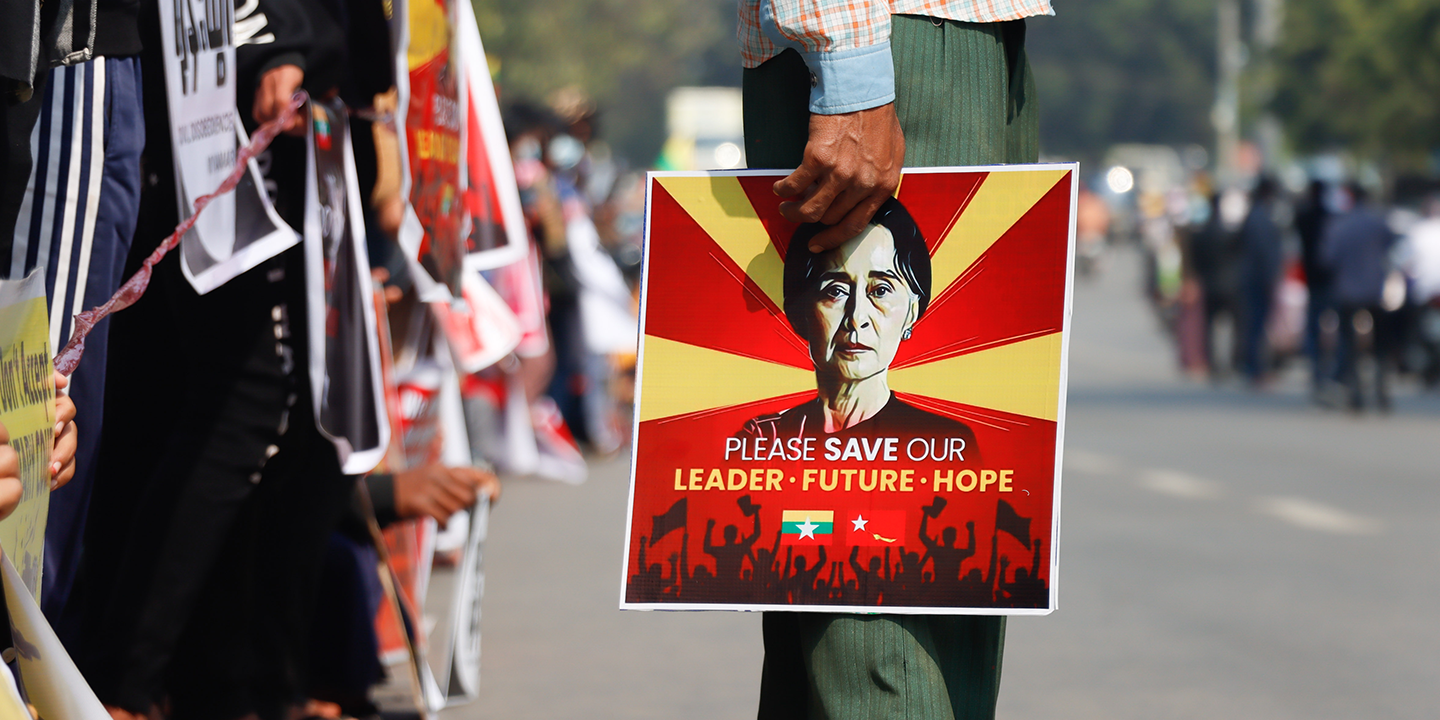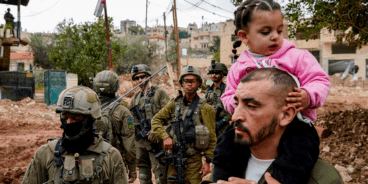

Atrocity Alert No. 257: Myanmar (Burma), Nigeria and Afghanistan
Atrocity Alert is a weekly publication by the Global Centre for the Responsibility to Protect highlighting situations where populations are at risk of, or are enduring, mass atrocity crimes.
UN WARNS OF “IMMINENT FURTHER BLOODSHED” IN MYANMAR
The security forces in Myanmar have killed at least 865 people since the 1 February military coup, while more than 4,900 people remain arbitrarily detained. Despite the deadly crackdown and escalating armed conflict in some states, pro-democracy protests continue. Armed resistance is also growing. On 15 June the military burned down the village of Kin Ma, in Magway region – destroying over 180 homes and forcing 1,000 people to flee – in retaliation for local attacks on the military. At least two elderly villagers were burned to death.
Meanwhile, in response to escalating armed conflict in Kayah and Chin states, on Friday, 11 June, the UN High Commissioner for Human Rights, Michelle Bachelet, warned of “imminent further bloodshed and suffering” in Myanmar. According to Bachelet, “state security forces have continued to use heavy weaponry, including airstrikes, against armed groups and against civilians and civilian objects, including Christian churches.” At least eight churches have been destroyed or damaged by the military in recent weeks in Kayah and Shan states and the UN has received credible reports of civilians being used as human shields by the military.
More than 108,000 people have fled their homes in Kayah State over the past three weeks. On 8 June the UN Special Rapporteur on the situation of human rights in Myanmar, Tom Andrews, appealed to the international community for immediate action, stressing that, “mass deaths from starvation, disease, and exposure, on a scale we have not yet seen since the February 1 coup, could occur in Kayah State absent immediate action.”
On Monday, 14 June, the trial of Myanmar’s democratically elected leader, Aung San Suu Kyi, also began in the capital, Naypyidaw. The military has charged Aung San Suu Kyi with various alleged crimes and if found guilty she could face up to 15 years in prison.
This Friday, 18 June, both the UN Security Council and General Assembly will meet to discuss the situation in Myanmar. The General Assembly is expected to adopt a resolution that calls on the military to “immediately and unconditionally release President Win Myint, State Counsellor Aung San Suu Kyi … and all those who have been arbitrarily detained, charged or arrested” and calls on “all member states to prevent the flow of arms into Myanmar.”
All UN member states need to uphold their responsibility to protect the people of Myanmar, including by imposing targeted sanctions and an arms embargo. There should be no diplomatic recognition of an illegal military junta that is committing atrocities against their own people.
NIGERIA FACES NEW SECURITY CRISIS AS BANDITS KILL 150 PEOPLE
Communities in north-west Nigeria are coming under increased attack from armed groups – described as “bandits” by locals – who are engaged in organized cattle-rustling, kidnapping, plunder, murder and rape. At least 88 people were killed when bandits attacked seven villages in Kebbi state on 3 June. Less than a week later, on 8 June, armed groups attacked Munawa, Malele and Randa villages in Zamfara state and kidnapped 60 women. Then from 10-11 June armed men on motorcycles attacked the villages of Kadawa, Kwata, Maduba, Ganda Samu, Saulawa and Askawa in Zamfara state, killing more than 50 people.
The alarming rise in violence in recent months has caused a humanitarian and protection crisis, with many people fleeing their homes, farms and grazing lands. According to the International Organization for Migration, there were more than 124,000 displaced persons in Zamfara State as of February. The bandits have also perpetrated attacks on secondary schools in Zamfara, Katsina and Niger states, kidnapping more than 800 children since December 2020.
Many of Nigeria’s bandit groups have been formed over the past decade in response to inter-communal conflict over land and resources. While the bandit gangs are driven largely by financial motives, many bandits come from the Fulani herder community and prey on settled farming communities, increasing ethnic tensions.
Meanwhile, civilians in the north-east of Nigeria have been severely impacted by increased attacks by the armed extremist groups Boko Haram and the Islamic State in West Africa. Since the beginning of the year, these groups have conducted dozens of raids on military bases and remote towns, forcing thousands of civilians to flee.
Facing the combined threat of large-scale banditry and ongoing attacks by armed extremist groups, Nigeria’s armed forces are now deployed in two-thirds of the states in the country. President Muhammadu Buhari is facing intense criticism for the security forces’ inability to provide civilians with adequate protection. There have also been reports of human rights violations and abuses perpetrated by the security forces.
Military operations alone cannot comprehensively defeat the combined threat of bandits and armed extremism in northern Nigeria. Dr. Simon Adams, Executive Director of the Global Centre for the Responsibility to Protect, said that, “the government also needs to address the grievances of local communities in the north and confront structural issues of endemic poverty, corruption, youth unemployment and environmental degradation that are exploited by bandits, armed extremists and other groups to recruit and grow.”
HAZARA MINORITY UNDER ATTACK IN AFGHANISTAN
On Monday, 13 June, seven civilians were killed when bombs were detonated in Dasht-e-Barchi, a predominantly Hazara neighborhood in Kabul, Afghanistan. The so-called Islamic State of Iraq and the Levant-Khorasan (ISIL-K) claimed responsibility for the attack, stating that the bombing targeted “disbeliever Shiites.” Earlier in June at least 18 people were killed in a series of attacks in Dasht-e-Barchi when four minibuses were bombed. On 8 June ISIL-K also carried out an attack on staff from the humanitarian mine-clearance organization, HALO Trust, killing 10 civilians and injuring 16, many of whom were Hazara.
The Hazara are one of Afghanistan’s most vulnerable ethnic and religious minorities and have frequently been targeted by armed extremists, with an increasing number of attacks taking place in Dasht-e-Barchi. On 8 May a bomb attack in front of the Sayed Al-Shuhada school in Dasht-e-Barchi killed over 85 Hazaras, many of them school children. During May 2020 unidentified attackers also stormed a maternity hospital in Dasht-e-Barchi, killing at least 24 civilians, including newborn babies and mothers.
Attacks targeting civil servants, journalists, professional women, human rights defenders, politicians and minority communities have all surged since the start of intra-Afghan peace negotiations last September. ISIL-K have claimed responsibility for some of these attacks, while the government often blames the Taliban, who deny responsibility. The intra-Afghan peace talks are now stalled as the Taliban and ISIL-K intensify their attacks on both government forces and civilians.
Jahaan Pittalwala, Research Analyst at the Global Centre for the Responsibility to Protect, said, “until all parties to the conflict meaningfully commit to a comprehensive ceasefire, targeted attacks on Afghan civilians, including religious and ethnic minorities, will continue to claim innocent lives. Intra-Afghan negotiations must prioritize the protection of civilians and adherence to international humanitarian and human rights law, as well as justice for victims.”
Related Content


Populations at Risk, March 2025
